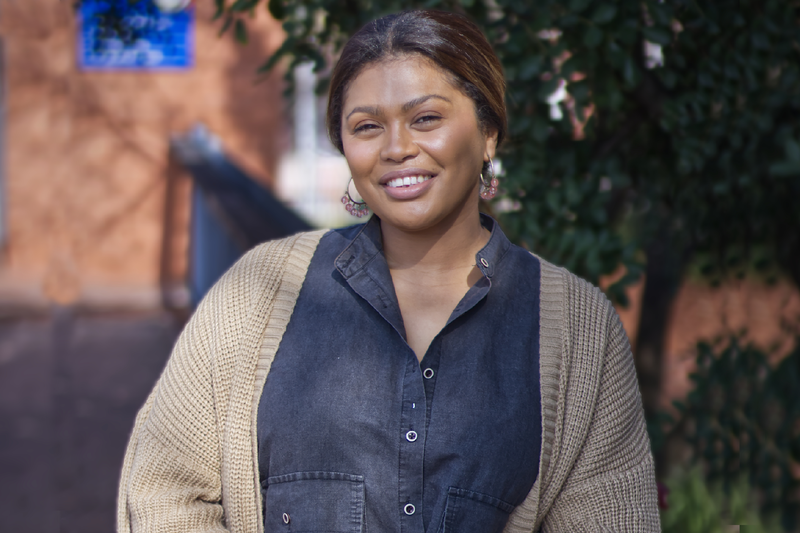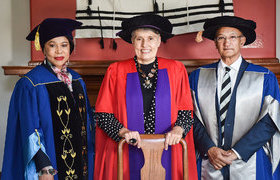‘To you, dad, with love and gratitude’
13 July 2023 | Story Niémah Davids. Photo Moloko Raphahlelo. Read time 10 min.
As Danielle Hill takes to the stage in the University of Cape Town’s (UCT) Sarah Baartman Hall to receive her PhD in architecture and planning from the School of Architecture, Planning and Geomatics, that short walk of academic fame in her red robe will be a poignant moment.
As her loved ones, peers and their families applaud excitedly at this monumental accomplishment, Danielle will take a moment to reflect on the years gone by. Though years of sacrifice, isolation and psychological and emotional pain have finally culminated in a doctorate, one particularly important person – her dad – is no longer around to join the celebration. Danielle always imagined he would be in the audience cheering and applauding loudly as she was capped, and even pictured him offering a few words of encouragement and toasting her success after the ceremony. After all, he was her biggest supporter, a motivator like no other, and the reason she could pursue her PhD after he settled her outstanding fee debt in 2018. But destiny had other plans.
In July 2021, Adam Jacobus Hill succumbed to COVID-19 complications; his sudden death shattered Danielle’s universe and changed her life in the blink of an eye. Today, as she ponders this upcoming milestone in her academic career, she finds it ironic that graduation day, 21 July, is just a few days before the anniversary of her dad’s death.
“It’s fascinating how everything panned out. Usually, my graduations would always be in December. For some reason this one is in July, which is so close to the anniversary of my dad’s death. It’s like the universe is trying to tell me something,” she said. “My dad’s unwavering sacrifice, prayer, support, encouragement, involvement and commitment to me as his daughter is something I will forever cherish.”
A ‘plattelandse meisie’
Danielle grew up in Saron in the Western Cape, a small Cape Winelands town situated approximately 20 kilometres from Porterville. Her parents were both pastors at a church in the town, and the family has spent years in service to the community.
“My parents have a remarkable story of faith, love, humility and service to others. I am because of them.”
The Hill children (Danielle and her sister Bronwyn) were both raised with strong Christian values, in a home where love, trust, service to others and forgiveness were the bedrock, and they remain so today. Danielle’s parents had always encouraged her to perform well at school so that she could further her education at university. To her parents, anything and everything was possible with hard work and dedication – and there was no such thing as a male-dominated industry, either. They encouraged their daughters to support each other, despite their age difference, and to set an example to the youth in the community.
“My parents have a remarkable story of faith, love, humility and service to others. I am because of them. This PhD would have been impossible without them. Their ability to always walk the extra mile has shaped and changed so many lives, including my own. This is something I intend to honour and pay forward,” she said.
Research in urban planning
Danielle describes her journey with UCT as an interesting one. By chance, she enrolled to complete her postgraduate diploma in African Studies at the institution in 2012, after an administrative glitch steered her towards that academic programme. Next, she completed her honours in city and regional planning. By then the academic bug had bitten hard, and Danielle made the decision to enrol for her master’s in Town and Regional Planning at the University of Pretoria (UP) in 2016. The inevitable next step was her PhD, which she started at the beginning of 2018.
“It’s thanks to my dad I could enrol for this PhD because he insisted on settling my outstanding fee debt as his gift to me. It didn’t come easy for him. My parents were both pensioners and had been saving up for a very long time to fix up the house as they approached their 70s. But he desperately wanted this degree for me, and gave me no choice but to accept,” she said.
After completing her postgraduate diploma in African studies, Danielle said, she knew that a PhD would be on the cards for her some day. She was determined to combine what she’d learned during that academic programme with urban planning. And it’s for this reason that her PhD includes African scholars and Global South literature, to help uncover new meanings and understandings of place-making. In a nutshell, her research focused on understanding the role of professional planners when it comes to managing the dynamics of informal settlements in South Africa. Specifically, she studied a pilot in situ Upgrading of an Informal Settlement Programme (UISP) in Thembalethu, a township in George in the Western Cape. During her research, she investigated the degree to which planners were able to intervene and manage the complexities intrinsic to a government-driven informal settlement upgrading process.
She interviewed several planners to understand how they viewed the Thembalethu UISP process and innovatively included these views in her thesis. Although city planners played a marginal role in this particular case, Danielle said, they provided crucial insight and expertise in the spatial direction and balance of the upgrade of this informal settlement.
“My research findings suggest that because planners were unable to contribute meaningfully to the planning process, it significantly hindered their ability to aptly reimagine the informal settlement.”
“My research findings suggest that because planners were unable to contribute meaningfully to the planning process, it significantly hindered their ability to aptly reimagine the informal settlement,” she said. “The thesis identifies management styles and the kind of leadership increasingly necessary for sensitive and contextual upgrading programmes like this one.”
Planning for dignified urban spaces
Hill’s research highlights that the future of informal settlements remains a deeply contested discourse in South Africa, and the need to decolonise city planning is clearer now than ever before. She argues that there’s a need to move towards adopting an African and decolonial view towards planning, and suggests making use of a grounded, learning-driven planning approach. This approach, she said, draws from the consciousness of decolonial work, and calls for deeper engagement with production and reproduction of spatial cultures and urban life. On a policy level, her findings point to the gap between and the need to closely align housing and planning legislation and policies in the country.
“The origin, culture and practice of urban planning has long been one of my fascinations, because informal settlements largely challenge the ‘plan’ in planning. As we strive towards planning for dignified urban spaces, we should closely evaluate and sit with the discomfort of the country’s socio-economic and political realities, as this is critical and necessary in order for us to think more innovatively about these interventions,” she said.
“Even with the growing bottom-up approaches in Global South cities, planning processes in South Africa are still run by technocrats. My thesis offers refreshing perspectives on a complicated topic that considers new (and many established) questions about the role of planning in relation to urban informality.”
“A love offering to both my parents”
Danielle described her PhD journey as both painful and therapeutic.
“This journey was filled with many twists and turns. But ultimately, it was a love offering to both my parents for their great sacrifices, and for being the driving force that led me to apply myself academically and complete this degree. I will be the first in my family to receive a PhD, but I could honestly not have done it without them. This journey can be a long, lonely and isolating road. But with the right support structure, it’s doable,” she said.
While reflecting on the rollercoaster five years that have passed so rapidly on the way to graduation day, Danielle said they have helped to shape the daughter, sister, partner, lecturer and friend she is today. As she begins to emerge from her shell after some years of academic hibernation, she is excited for what the future holds. For now, she’s focused on giving her students in the Town and Regional Planning Department at UP her undivided attention, to ensure that she contributes to their success.
“... My dad made the ultimate sacrifice. So, this PhD belongs to him.”
“It’s been a long, hard haul and today I’m at the finish line. Many have contributed and helped to get me here, in various shapes and forms. But my dad made the ultimate sacrifice. So, this PhD belongs to him. To you, dad, with love and gratitude.”
 This work is licensed under a Creative Commons Attribution-NoDerivatives 4.0 International License.
This work is licensed under a Creative Commons Attribution-NoDerivatives 4.0 International License.
Please view the republishing articles page for more information.










